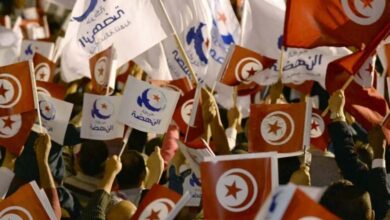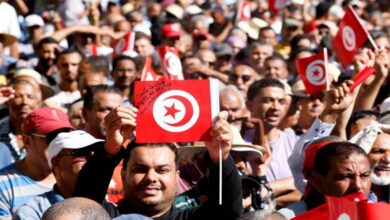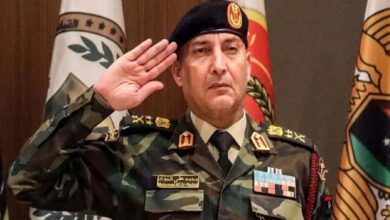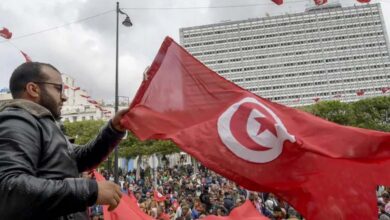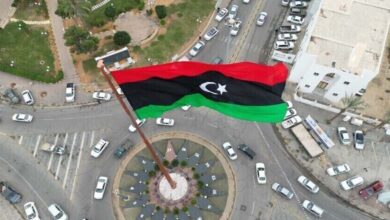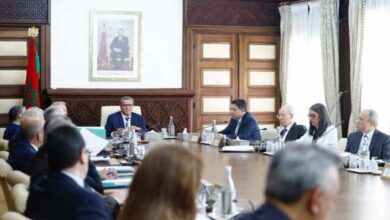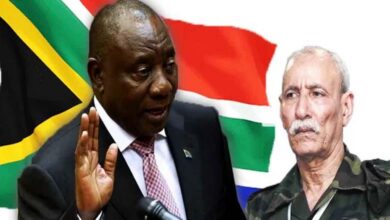Dbeibah defends decisions to neutralize armed groups despite rising violence
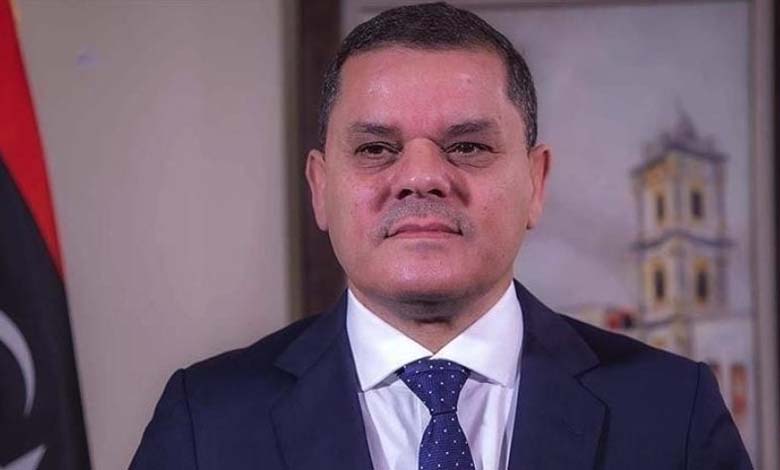
Dbeibah justifies dozens of deaths in clashes between his forces and the Deterrence Apparatus by citing haste in decision execution, while the UN Security Council demands accountability.
TRIPOLI – Libya’s outgoing Prime Minister of the Government of National Unity, Abdulhamid Dbeibah, defended on Saturday night his initiative for a “Militia-Free, Corruption-Free Libya” aimed at regaining control over the capital, Tripoli, affirming his determination to pursue his goals despite growing calls for his resignation following recent deadly armed clashes.
In a televised address, Dbeibah said: “Those who persist in corruption or extortion, we will not spare them. Our goal is a Libya free of militias and corruption.”
-
Dbeibah after the Blinken meeting : Libya mercenaries must leave
-
Head of Egyptian Intelligence in Tripoli and supplies for al-Dbeibah visit
Dbeibah added: “Militias have overgrown, controlling the entire political, financial, economic, and even social scenes. They split into three groups: one withdrew to civilian life, another integrated into state institutions, and the third extorts the state. Some of these militias have grown larger than the state itself. When our government came to power, we found this reality and tried to handle it calmly and gradually.”
urged militia-affiliated youth to join state institutions, stating: “We want Tripoli to return to normal. The true future of the state lies with the army and police. We were late, but we have started.”
-
Where is Western Libya Heading? Open Scenarios for the Future of the Conflict
-
Militia Arms Chaos Reignites Violence Spiral in Tripoli
came to power in 2021 through a UN-backed process. Elections planned for that year were delayed due to rival faction disputes, allowing him to stay in power.
Observers believe Dbeibah’s late-night speech is an attempt to defend his project to neutralize the Presidential Council’s affiliated armed factions and secure Tripoli to ensure his grip on power.
He detailed recent clashes in the capital among civilians: “We launched a swift, bloodless operation on Monday, successfully dismantling a militia that had spread death, theft, torture, and blackmail.”
-
Heavy Clashes in Tripoli After the Killing of a Militia Leader Affiliated with the Presidential Council
-
Corruption and Terrorism Financing Drive Washington to Suspend Aid to Libya
He stated that the militia “controlled six banks, extorted the state and ministers, and imprisoned, tortured, and executed dissenters,” referencing the death of militia leader Abdelghani Al-Kikli, known as Gheniwa, and the surprise defeat of the Stabilization Support Apparatus by pro-Dbeibah factions.
The Apparatus, under the Presidential Council formed with Dbeibah’s government in 2021, was based in the densely populated Abu Salim district.
The Interior Ministry reported nine decomposed bodies found in a morgue refrigerator at Al-Khadra Hospital in Abu Salim, which had not been reported by the National Security Agency.
-
Libya’s Muslim Brotherhood Incites Armed Resistance Against Peaceful Solutions
-
Armed Clashes in Tripoli Reveal Fragility of Security Situation
Dbeibah‘s media office shared a video of him saluting security forces guarding the Prime Minister’s Office. He later met with local dignitaries to discuss the situation and what was called a “successful security operation in Abu Salim.”
office added: “The Prime Minister affirmed that this operation is part of the state’s firm vision to dismantle armed groups operating outside official police and military institutions.”
Defending post-operation decisions, Dbeibah said: “We issued a series of decisions replacing some leaders, including the head of Internal Security and the Prison Authority chief, Osama Najim, who was shockingly implicated in atrocities by an ICC report. Such a person cannot remain in office for another day.”
-
Calls in Libya to Prevent Tunisian Arrest Warrant against Muslim Brotherhood Businessman
-
Clashes Between Militias in Tripoli Mar Eid Atmosphere
Following Dbeibah’s order on Tuesday to dismantle armed groups, Tripoli saw its deadliest clashes in years between two militias, killing at least eight civilians, according to the UN. Dbeibah acknowledged shared blame for the deadly clashes involving his forces and the rival Deterrence Force: “The error came from rushed implementation of government decisions, leading to a disaster among civilians. This deeply upset us.”
In a bid to contain the situation, the Defense Ministry announced a ceasefire on Wednesday in Tripoli.
-
Complications Hindering the Evacuation of Militias from Tripoli
-
Haftar grants Dbeibeh a deadline for the fair distribution of oil revenues and threatens war
Referring to the Deterrence Force’s attack on the 444 Brigade on Tuesday evening, Dbeibah said: “This was an attempted coup orchestrated by militia leaders, House Speaker Aguila Saleh, former State Council head Khaled Al-Mishri, and Rajma-based eastern leaders.”
speech comes amid unprecedented tension in Tripoli, following recent unrest that caused civilian and military casualties and major damage to public and private property.
Earlier, protesters from western Libyan cities gathered at Martyrs’ Square on Saturday demanding Dbeibah’s ouster. Unlike Friday’s mass protest that ended in riots and an attempt to storm the PM’s office, Saturday’s rally remained peaceful.
-
Libyan candidates talk and militias mobilize as electoral process collapse
-
After Turkish Intelligence Service Tries to Recruit Him.. Who Is Lotfi Al-Harari, Deputy Chief of the Libyan Security Service?
Responding to protesters, several ministers and senior officials resigned, including Economy Minister Mohamed Al-Hweij, Local Governance Minister Badr Al-Din Al-Toumi, Culture Minister Mabrouka Touki, Justice Minister Halima Al-Bouseifi, Housing Minister Abubakr Al-Ghaoui, Deputy PM Ramadan Abou Janah, and Water Resources Deputy Minister Mohamed Faraj Qneidi.
The UN Security Council urged accountability for attacks on civilians and expressed “deep concern” over rising violence in Tripoli.
In a statement Saturday night, the Council cited reports of civilian casualties, called on all sides to protect civilians, and welcomed news of a ceasefire agreement. They emphasized its unconditional respect and the need for a permanent ceasefire.
-
Libya: A vote of confidence session would hold on March 8 Sirte
-
Weapon Chaos in Libya: Zawiya under the Grip of the Al-Farr and Al-Qasab Conflict
They reaffirmed commitment to a Libyan-led political process facilitated by the UN and the unification of all institutions, including military and security bodies.
They stressed the urgency of progress toward lasting peace and security for the Libyan people and reiterated support for the UN mission and Libya’s sovereignty, independence, territorial integrity, and national unity.
On Friday, human rights officials reported that live ammunition was used by security forces to disperse protesters in Tripoli.
-
Political Stalemate Brings Militias in Western Libya Back into the Spotlight
-
Western Libya Ablaze: Bloody Clashes Turn Streets into Warzones
Since Saturday morning, Tripoli has experienced cautious calm with schools reopening, the University of Tripoli resuming classes, air traffic resuming at Mitiga Airport, and markets and shops reopening.
However, education offices in three municipalities and banks like Al-Wahda and the Bank of Commerce and Development declared civil disobedience, reflecting ongoing opposition to the government and continued calls for its removal.Dbeibah faces growing challenges in maintaining power and pursuing his plan to neutralize militias. As violence and political division escalate in Tripoli, the city’s political and security future depends on whether the parties can reach sustainable and peaceful solutions.





